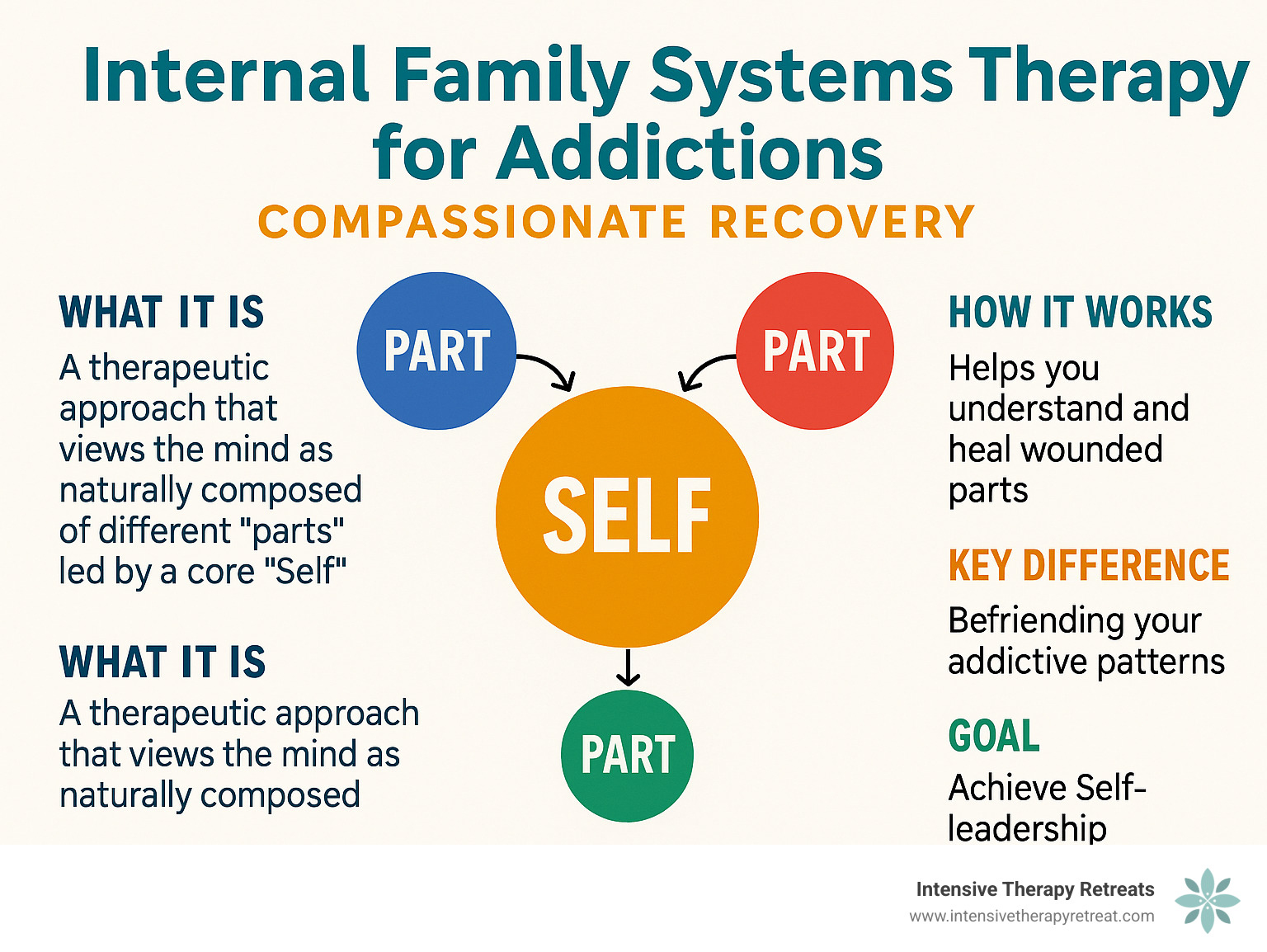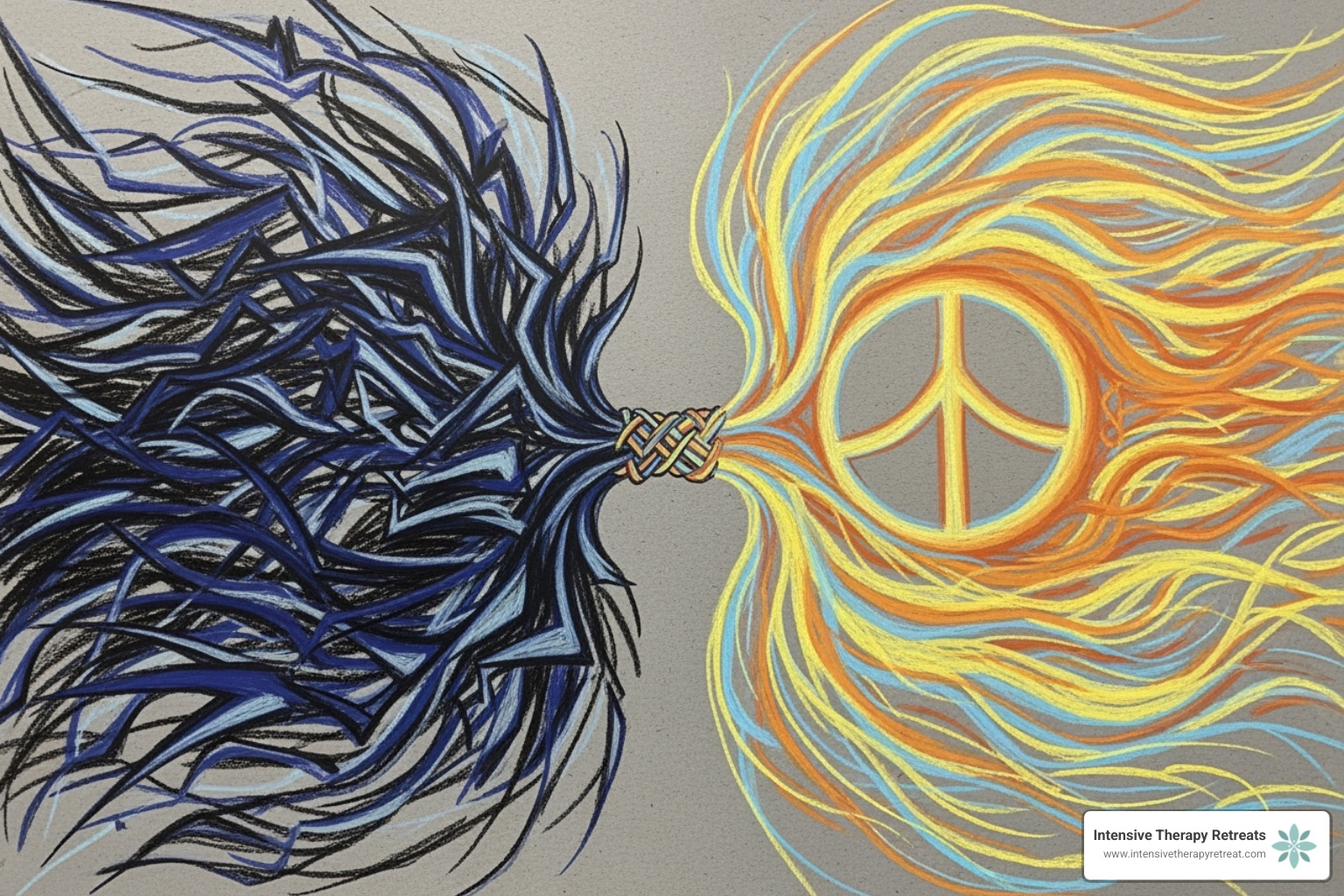A New Path to Healing from Addiction
Internal family systems therapy for addictions offers a approach to recovery that moves beyond shame and willpower to address the root causes of addictive behaviors. This compassionate, trauma-informed method recognizes that addiction isn’t a moral failing or lack of control—it’s often a protective response by parts of ourselves trying to manage overwhelming pain.
Quick Overview: Internal Family Systems Therapy for Addictions
- What it is: A therapeutic approach that views the mind as naturally composed of different “parts” led by a core “Self”
- How it works: Helps you understand and heal the wounded parts driving addictive behaviors
- Key difference: Focuses on befriending rather than fighting your addictive patterns
- Goal: Achieve Self-leadership where your authentic core guides healing decisions
- Best for: Those seeking to address underlying trauma and emotional wounds fueling addiction
The statistics are sobering: from March 2020 to March 2021, U.S. alcohol sales rose 54% and overdose deaths increased 18.2%. This crisis highlights the need for deeper healing. Approaches like IFS address the why behind addiction, not just the what.
Traditional models often create an internal war between the ‘good’ part that wants to quit and the ‘bad’ part that uses substances. IFS takes a different approach, recognizing that all parts—even destructive ones—are trying to protect us. This shift from judgment to curiosity opens the door to genuine healing.
I’m Dr. Bambi Rattner. With decades of clinical experience in trauma and addiction, I’ve seen how internal family systems therapy for addictions transforms lives by helping people develop a compassionate relationship with all parts of themselves. My work with intensive therapy retreats confirms that when we stop fighting ourselves and start understanding our internal world, lasting recovery becomes possible.
Must-know internal family systems therapy for addictions terms:
Understanding the IFS Model: Your Inner World and Addiction
Imagine your mind isn’t a single voice, but an internal community of different parts, each with its own personality and concerns. This is the core insight Dr. Richard Schwartz introduced when he developed internal family systems therapy for addictions in the 1980s.
Unlike traditional approaches that treat internal conflict as a problem, IFS recognizes that having multiple parts is natural. We all have responsible parts, hurt parts, and fun-seeking parts. The key isn’t eliminating them, but helping them work together harmoniously.
At the center of this system is the Self—your authentic, wise, compassionate core. The Self is the natural leader of your internal family, possessing the 8 C’s: Calmness, Curiosity, Courage, Compassion, Confidence, Creativity, Clarity, and Connectedness. These qualities don’t need to be developed; they are already within you, waiting to emerge when your parts feel safe.
Regarding addiction, the goal isn’t to fight destructive parts. Instead, internal family systems therapy for addictions helps you access your Self to understand these parts and help them find healthier ways to meet their needs.
To dive deeper into this transformative process, you can explore How Does Internal Family Systems Therapy Work?.
The Key Players: Exiles, Managers, and Firefighters
Your internal parts typically organize into three main roles, each crucial to how addiction develops and persists.
Exiles are the tender, younger parts carrying the weight of past pain, trauma, and difficult experiences. They hold memories of abandonment, rejection, or shame. Because their pain is overwhelming, other parts try to hide them, hence the name ‘exiles.’
For example, a part wounded by childhood neglect might believe ‘I’m not worthy of love.’ These exiled parts don’t disappear as we age; they remain, holding their original pain and longing for healing.
Managers are proactive protectors, working to keep you safe and prevent exile wounds from being triggered. They act like vigilant security guards, scanning for threats and trying to control situations to prevent problems.
Managers can manifest as perfectionism, people-pleasing, or an intense need for control. Their intentions are good—to protect you—but their methods can be exhausting and rigid.
Firefighters are emergency responders. They activate when an exile’s pain breaks through the managers’ defenses. When emotions become overwhelming, firefighters rush in with immediate relief, which is often where addictive behaviors appear.
Substance use, compulsive shopping, or binge eating are common firefighter responses. These parts aren’t trying to destroy your life; they’re desperately trying to soothe unbearable pain as quickly as possible.
Understanding these roles transforms how we view addiction. It’s not a personal failing but a firefighter part protecting a wounded exile. For a comprehensive understanding, refer to A glossary of IFS terms.
The Role of Trauma in Fueling Addictive Behaviors
Through an IFS lens, trauma isn’t just a factor in addiction—it’s often the original wound that activates the protective system. During overwhelming experiences, especially in childhood, parts become burdened with the emotions, beliefs, and sensations from those events.
Research on Adverse Childhood Experiences (ACEs) confirms the link between early trauma and addiction. IFS explains the how: when a child experiences trauma, exile parts form to hold that pain, taking on burdens like ‘I’m worthless’ or ‘The world isn’t safe.’
Protective parts then organize around keeping these exiles from being hurt again. Managers might develop strategies like perfectionism, while firefighters prepare to jump in with immediate relief when the original pain surfaces.
From this perspective, addiction isn’t the problem—it’s a symptom of a deeper wound needing healing. The firefighter part using substances is trying to help, even if its methods cause harm.
This understanding opens the door to a different kind of healing. Instead of fighting addictive behaviors, internal family systems therapy for addictions helps you develop a relationship with these parts from your Self—with curiosity, compassion, and care.
Approaching our parts this way makes remarkable healing possible. Protective parts can begin to trust the Self to care for wounded exiles, allowing them to step back from their extreme roles. To learn more about this trauma-informed approach, explore Internal Family Systems Therapy for Trauma.
The Addictive Cycle: How Internal Conflict Fuels Compulsion
When we understand internal family systems therapy for addictions, we see that addiction isn’t just about substances—it’s about an intense internal war. This conflict, which IFS calls “polarization,” creates a relentless cycle that keeps us trapped.
Picture Sarah, who struggles with alcohol addiction. Her story illustrates this internal battle. Sarah has a manager part that’s incredibly controlling—it demands perfection, criticizes mistakes, and maintains rigid schedules. This manager works overtime to keep Sarah’s exiled pain buried.
But despite that control, the exile’s overwhelming emotions eventually surface—perhaps loneliness from her childhood or shame from feeling abandoned. When these feelings become too much, her firefighter part springs into action.
The firefighter doesn’t think—it reacts. It reaches for the wine bottle for immediate relief from the emotional flood. For a few hours, the pain disappears. But when morning comes, her manager part returns with a vengeance, bringing waves of shame and harsh self-criticism about the drinking.
“You’re weak,” the manager says. “You have no willpower.” This judgment makes the exile feel even more ashamed, so the manager works harder to maintain control, setting up the next inevitable crash when the firefighter takes over.
This isn’t a moral failing—it’s a desperate internal system trying to protect itself. Each part believes it’s helping. The manager thinks control will keep Sarah safe. The firefighter thinks alcohol will soothe the pain. Even the exile is trying to get the care it never received.
Understanding this cycle is crucial because it shows why willpower alone rarely works. We’re not fighting one enemy but are caught in a complex internal family drama. This is what we explore in our Parts Work IFS Therapy Approach.
Breaking the Cycle: The Goal of Internal Family Systems Therapy for Addictions
The beauty of internal family systems therapy for addictions is that it doesn’t ask you to wage another war against yourself. It offers a different path—one where your authentic Self becomes the wise, compassionate leader of your internal family.
Imagine if Sarah’s internal family had a skilled mediator—that mediator is her Self, the part of her that’s naturally calm, curious, and caring. When the Self is in charge, everything changes.
Instead of fighting her addictive patterns, Sarah learns to approach them with curiosity. “What are you trying to protect me from?” she might ask her firefighter part. This shift from judgment to understanding is where real healing begins.
The goal isn’t to eliminate these parts. Instead, we focus on befriending each part and helping them find healthier ways to contribute. The manager might become a helpful organizer instead of a harsh critic. The firefighter might learn to soothe through connection rather than substances.
Most importantly, we work on healing the wounded exiles that carry the original pain. When these young, hurt parts finally receive the love and attention they’ve been crying out for, they no longer need such extreme protection. The exile that felt abandoned can experience being truly seen and cared for.
This process creates Self-leadership—a state where your wise, compassionate core guides your internal system with love instead of fear. From this place, healthy choices feel natural, not forced. You’re not white-knuckling your way through recovery; you’re making decisions from a place of genuine self-care.
When people experience this deep internal harmony, lasting change becomes possible. Recovery stops being about restriction and becomes about restoration—restoring the natural balance and wisdom that was always there. This approach has shown remarkable results, which you can learn more about in Positive Impact of Internal Family Systems Therapy (IFS). True healing happens not through force, but through self-compassion.
The Healing Journey: Practical Steps in IFS Therapy for Addictions
Starting on the healing journey with internal family systems therapy for addictions is like learning to become a compassionate leader of your own inner world. It’s not about forcing change or fighting against yourself—it’s about creating the conditions for natural healing to unfold.
The first step is accessing your Self-energy, that core part of you that naturally possesses calmness, curiosity, courage, and compassion. When you’re connected to your Self, you can approach even your most challenging parts without judgment. Think of it like being a wise, loving parent to all the different aspects of yourself.
Our therapists guide you through what we call the “6 F’s”—a gentle framework for connecting with your parts. You begin by finding the part that drives your addictive behavior, then focusing your attention on it with curiosity rather than criticism. As you flesh out the details of this part—how it looks, feels, what age it might be—you start to see it as a separate entity with its own story.
The magic happens when you feel toward this part from your Self. If judgment arises, we help you ask those critical voices to step aside so you can truly befriend the addictive part. Finally, you explore what this part fears would happen if it stopped its protective role. This often reveals the deeper pain it’s been trying to shield you from.
The therapist’s role is to help you stay grounded in Self-energy throughout this process. We create a safe container where you can explore your inner world at your own pace, building trust with even the parts that have caused the most harm. This isn’t about quick fixes—it’s about developing a lifelong skill of compassionate self-leadership.
To deepen your understanding of this transformative approach, explore The Practice of Internal Family Systems (IFS).
Befriending Your Addictive Parts
Here’s where internal family systems therapy for addictions gets revolutionary: instead of battling your addictive parts, you learn to genuinely befriend them. I know this might sound backwards—why would you want to be friends with the part that’s causing so much pain?
The answer lies in understanding that your addictive part isn’t trying to harm you. It’s actually trying to protect you from something even more painful. When you approach this part with genuine curiosity from your Self, you might ask, “What are you trying to do for me?” or “What are you afraid would happen if you stopped?”
The answers often reveal touching attempts at protection. That part that reaches for alcohol might be trying to soothe unbearable loneliness. The gambling part might be desperately seeking excitement to escape feelings of emptiness. These aren’t character flaws—they’re misguided rescue attempts.
Dialogue becomes a powerful tool here. You can literally have conversations with your parts, either internally or out loud. It might feel strange at first, but most people are amazed by what their parts have to say when finally given a voice.
Visualization helps too. You might imagine your addictive part as a specific character—maybe a frantic teenager trying to escape pain, or an exhausted adult carrying too much responsibility. Seeing the part this way helps you separate from it, so you’re not overwhelmed by its emotions.
Journaling from different parts’ perspectives can be incredibly revealing. Write as the addictive part, then respond from your Self. The conversations that emerge often surprise people with their wisdom and compassion.
As you build trust with these protective parts, something beautiful happens. They begin to relax their extreme roles, knowing that your Self can find healthier ways to address the underlying pain. We provide practical tools like Internal Family Systems Therapy Worksheets to support this process.
Healing Wounded Exiles Through Unburdening
Once your protective parts trust that your Self can handle the deeper pain, you’re ready for the most profound aspect of internal family systems therapy for addictions: healing your wounded exiles through unburdening.
Your exiled parts are like children who got stuck in time, still carrying the raw emotions from past traumas. They’ve been locked away because their pain felt too overwhelming for your system to handle. But now, with your Self present and your protective parts relaxed, these exiles can finally receive the healing they’ve been waiting for.
Witnessing the pain is the first step. From your compassionate Self, you gently approach the exiled part and truly see its original hurt. This isn’t about reliving trauma—it’s about providing the loving witness that was missing during the original painful experience.
Next comes retrieving the exile. You might visualize going back to that younger version of yourself and inviting them into the safety of your current Self. Picture bringing that hurt child or teenager into a warm, protected space where they can finally feel safe.
The unburdening itself often feels like a profound release. The exiled part can let go of the shame, terror, or despair it’s been carrying all these years. These emotions weren’t meant to be permanent burdens—they were responses to situations that are now in the past.
As the exile releases these old wounds, something remarkable happens. That part transforms from a source of pain into a source of vitality and joy. The protective parts, no longer needed for such intensive guard duty, can also shift into more balanced roles. Your entire inner system reorganizes around the leadership of your Self.
This deep healing addresses the root causes that drove your addictive behaviors in the first place. When the underlying pain is resolved, the desperate need for numbing or escape naturally diminishes. Learn more about this transformative process in The Model of Internal Family Systems Therapy for Trauma Treatment.
Frequently Asked Questions about IFS and Addiction
When you’re considering a new path to healing, it’s natural to have questions. Let me address some of the most common concerns people share about internal family systems therapy for addictions.
How is IFS different from other approaches to addiction recovery?
The heart of what makes internal family systems therapy for addictions unique lies in how it views your struggle. Instead of seeing addiction as something you need to fight against or control through willpower, IFS recognizes that your addictive behaviors are actually protective parts trying to help you survive emotional pain.
This creates a non-pathologizing approach that doesn’t label you as diseased or broken. Rather than asking “What’s wrong with you?” IFS asks “What happened to you, and how are your parts trying to protect you from that pain?”
While many traditional approaches focus on changing external behaviors or thought patterns, IFS focuses on your internal psychological system. We work to understand why these protective patterns developed in the first place. It’s not about battling your addiction—it’s about compassionately exploring what purpose it serves.
Trauma sits at the center of our approach because we’ve seen how unresolved emotional wounds often fuel addictive behaviors. When we heal these underlying wounds, the desperate need for protection naturally decreases.
The goal isn’t to force change through external rules or fear of consequences. Instead, we help you develop Self-leadership—accessing your own innate wisdom and compassion to guide your healing journey.
IFS works beautifully alongside other supportive resources like support groups, medical care, and family therapy to create comprehensive healing.
What are the benefits and limitations of using internal family systems therapy for addictions?
The benefits of this approach run deep. IFS addresses root causes rather than just managing symptoms, which means we’re healing the underlying trauma and emotional pain that drive addictive behaviors. This creates lasting change from the inside out.
One of the most profound shifts people experience is reduced shame and self-criticism. When you understand that your addictive part has been trying to protect you, the harsh internal voice often softens into something more compassionate. This fosters genuine self-compassion, which becomes a foundation for sustainable recovery.
Because we’re healing at the source, IFS promotes lasting change rather than temporary behavioral shifts. You’re not white-knuckling your way through recovery—you’re actually changing your relationship with yourself. This approach is also empowering because you learn to access your own inner wisdom rather than relying solely on external support.
Research shows promise for IFS in treating various addictions, including internet addiction, demonstrating its versatility across different addictive behaviors.
However, there are some important considerations. IFS requires a trained therapist who understands both the model and addiction treatment. The nuanced nature of parts work means finding qualified expertise is essential.
For individuals with severe, life-threatening behaviors, IFS may need additional support like medical detox or intensive programs to ensure immediate safety. We’re not talking about replacing medical care when it’s needed.
Finally, patience is required. Deep internal healing takes time, and while our intensive format can accelerate initial breakthroughs, true integration is an ongoing process. It’s not a quick fix, but it offers something more valuable—genuine change.
How long does IFS therapy for addiction take?
This is one of the most honest answers I can give you: recovery is a non-linear process, and healing happens on its own timeline. The duration varies significantly based on your unique history and circumstances.
Individual history plays a major role. If you’re carrying trauma from early childhood, have multiple exiled parts holding pain, or have deeply entrenched protective patterns, the initial healing phases may take longer. The complexity of your internal system influences how much time the unburdening process requires.
The severity and duration of addictive behaviors also matters. Parts that have been working overtime for years may need more time to trust that it’s safe to relax their protective roles.
Your commitment to the process significantly impacts progress. Consistent engagement with therapy and willingness to do internal work between sessions can accelerate healing.
At Intensive Therapy Retreats, our focus remains on deep, sustainable healing rather than quick fixes. Our intensive format can create significant breakthroughs in days by providing focused, immersive experiences, but the journey of integration and continued Self-leadership extends beyond the retreat itself.
The beautiful thing about this work is that it’s about achieving profound, lasting change. While there can be Challenges That Arise From Internal Family Systems (IFS) Therapy, the depth of change makes the investment of time worthwhile.
We’re not just trying to stop a behavior—we’re healing the wounds that made that behavior necessary in the first place. That kind of healing deserves the time it needs.
Begin Your Compassionate Recovery Journey
If you’ve made it this far, you’ve already taken a courageous step toward understanding yourself in a completely new way. Internal family systems therapy for addictions isn’t just another treatment approach—it’s a profound shift in how you relate to the parts of yourself that have been struggling with addiction.
The beauty of this approach lies in its fundamental belief that you are not broken. You don’t need to be fixed, controlled, or managed. Instead, you have within you everything needed for healing—a wise, compassionate Self that can lead your internal system with love rather than judgment.
Changing your relationship with yourself changes everything. When you stop fighting the parts of you involved in addictive behaviors and start understanding their protective intentions, something remarkable happens. The internal war that has been exhausting you for so long begins to quiet. In its place, you find a sense of inner harmony you may have never experienced before.
This journey requires patience and compassion—qualities that your Self naturally possesses. It’s not about willpower or trying harder. It’s about going deeper, healing the wounded parts that have been driving the addiction, and allowing your authentic Self to guide your choices.
At Intensive Therapy Retreats, we’ve witnessed countless individuals transform their lives through this compassionate approach. Our specialized programs create the focused, immersive environment where deep healing can unfold more rapidly than traditional weekly therapy allows. When you’re ready to step away from the cycle of shame and struggle, and into a life guided by Self-leadership, we’re here to support you.
Lasting recovery is absolutely possible. It begins with treating yourself with the same kindness you would offer a dear friend—because that’s exactly what you’re learning to become to all the parts of yourself.
Ready to find how this transformative approach could accelerate your healing journey? Find how an Intensive IFS Therapy Retreat can accelerate your healing. Your compassionate Self is waiting to lead the way.



